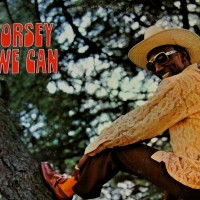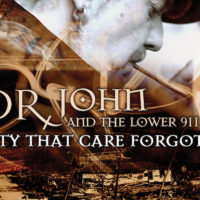Decades before it became a catchy rallying cry for an historic presidential campaign, “Yes We Can” was associated with an inspired message of another kind: the essence of New Orleans-styled funk.
Crescent City all-world songwriter and producer Allen Toussaint has done more in his behind-the-scenes role to shape New Orleans R&B than any other single figure. It’s safe bet that all the latter 20th century music of the Big Easy that we’ve tackled on this little corner of the blogosphere has some sort of a connection with Toussaint in one way or another. Ultimately, it has been the people out front performing his songs who had popularized his vision. Throughout much of the sixties, one of Toussaint’s most effective frontmen was fellow New Orleanian Lee Dorsey.
Dorsey has a couple of top ten hits during that time: the catchy, child-like “Ya Ya” in 1961 and Toussaint’s own “Working In A Coal Mine” five years later. These and some lesser hits were all issued originally as only singles on the old Amy label. At the dawn of the seventies, however, Dorsey and Toussaint collaborated on a full fledged album that is the topic of this piece.
Yes We Can was one of those records where all the players involved were feeling it: the Meters funky backing band, Dorsey’s soulful, even-tempered vocals and Toussaint’s production and songwriting. It was all done with subtle sophistication and just the right amount of grit. This was where the sixties funk became the seventies funk.
That’s evident everywhere on the record. Take the slow funk of “Riverboat;” the supple, sparse rhythm anchored by Ziggy Modeliste’s rolling beat, George Porter’s lean bass lines and Leo Nocentelli’s bluesy wah-wah lines. Toussaint charts horns that add a little weight but don’t get in the way of Dorsey’s breezy lead vocals. “O Me-O, My-O” follows the same formula for success with some nice call and response backing vocals.
The protest rocker “Who’s Gonna Help Brother Get Further” reminds us that this was a time where black-and-white loomed large as a social issue but the lines between black and white music were much more blurred. “Gator Tail” is a sweaty, James Brown-style workout and that crack band is providing enough punch to rival the JB’s.
As proof that the Meters didn’t need to rely Toussaint’s mighty pen to sound good, there’s the lone cover, Joe South’s “Games People Play,” which features Porter with an early adaptation of Larry Graham’s then-new thumb-popping method. Porter shines again in the Wilson Pickett-like stomper “When The Bill’s Paid.”
Since humor was always a big part of Dorsey’s musical personality, it’s only fitting that the album includes a stand-up comedy routine set to music, the grin-inducing “Would You.”
As solid as this record is, it never caught fire with record buyers. If imitation is the best form of flattery, however, Yes We Can has been honored time and again. Robert Palmer made “Sneaking Sally Through The Alley” the title song of his first album (even borrowing members of the Meters to play on it). Ringo Starr covered “Occapella” on his Goodnight Vienna album. The title song was an early hit for the Pointer Sisters and John Scofield once built a song entirely around its insistent bass riff.
Today,Yes We Can is only available domestically as part of a twofer with Dorsey’s only other album in the seventies, Night People. Yes We Can by itself, though, is a three-fer: some of the best of Dorsey, Toussaint and the Meters all rolled up into a single collection of maximal Crescent City rhythm and blues.
- Matthew Shipp – ‘The Cosmic Piano’ (2025) - June 17, 2025
- Ivo Perelman & Matthew Shipp String Trio – ‘Armageddon Flower’ (2025) - June 16, 2025
- Claudio Scolari Project – ‘Bloom’ (2025) - June 12, 2025



